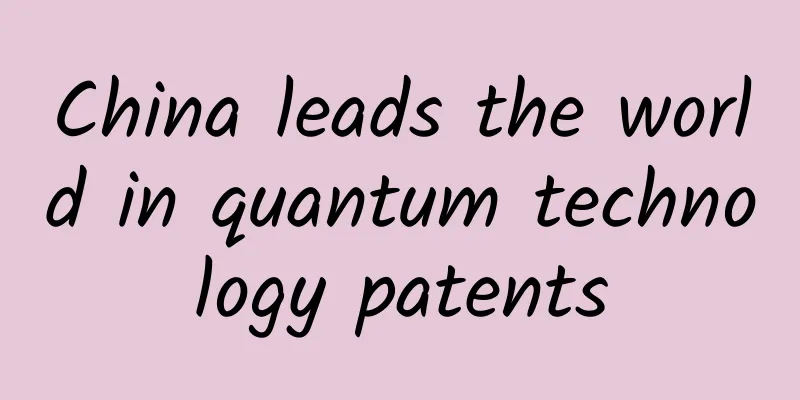China leads the world in quantum technology patents

|
Quantum technology has become the commanding height of future science and technology, and will also become one of the important technologies that will affect economic competitiveness in the long run. At present, quantum technology is far from mature and is still in the exploratory stage. It will take some time to develop. China, Europe, the United States, Japan, South Korea and other countries and regions are increasing their investment. According to foreign media reports, the United States has always been a world leader in various technologies, but in quantum technology, China is taking the lead. Cooperation with allies such as Japan will be key for the Biden administration of US President to maintain the United States' competitiveness in this field. China leads in quantum technology patentsAccording to an analysis of quantum technology-related patents by Valuenex, a big data predictive analysis and consulting service company, China has more than 3,000 quantum technology-related patents, about twice as many as the United States. In terms of quantum computing hardware, the United States has a clear advantage in the number of patents. IBM ranks first with 140 patents, Microsoft ranks third with 81 patents, Google ranks fourth with 65 patents, and Intel ranks fifth. The United States occupies four seats in the top five companies. In terms of software, the top three patent rankings are all occupied by American companies, followed by Japan's NTT ranked fourth and China's Harbin Institute of Technology ranked fifth. It is worth mentioning that IBM ranks first in both quantum computing software and hardware. But in quantum communication and cryptography, China is in the lead, with Japan's Toshiba ranking first, Huawei ranking second with 100 patents, and Beijing University of Posts and Telecommunications ranking fourth with 84 patents. China's quantum computing development is on the way and continues to climbSeveral countries, including China, have launched quantum computing cloud platforms. In the European Digital Planning Guidelines recently released by the European Union, it is planned to build the first computer with quantum acceleration in 2025. Quantum computing is a cutting-edge technology, and Europe's layout in quantum computers is also a necessary choice to enhance its own technological competitive advantage. In 2016, China successfully launched the world's first quantum science experimental satellite "Micius". As a scientific experimental satellite, "Micius" has two main purposes: one is to achieve ultra-long-distance quantum secure communication between the satellite and the ground, and the other is to conduct a strict verification of the "non-locality of quantum mechanics" proposed by Einstein. It is understood that "Micius" has completed its mission very well. In 2020, the University of Science and Technology of China announced that Professor Pan Jianwei and others at the school had successfully built a 76-photon quantum computing prototype "Jiuzhang", which only took 200 seconds to solve the mathematical algorithm Gaussian boson sampling, outperforming Google's 53-qubit quantum computer prototype. In February this year, the National University of Defense Technology revealed that the QUANTA team of the School of Computer Science of the university, in collaboration with the Academy of Military Science, Sun Yat-sen University and other domestic and foreign institutions, has developed a new type of programmable silicon-based optical quantum computing chip, which has realized quantum algorithm solutions to a variety of graph theory problems and is expected to be applied in fields such as big data processing in the future. The recently released 14th Five-Year Plan points out that in the basic core areas related to national security and overall development, strategic scientific plans and scientific projects should be formulated and implemented. Aiming at cutting-edge fields such as artificial intelligence, quantum information, and integrated circuits, a number of forward-looking and strategic national major scientific and technological projects should be implemented. It is necessary to achieve the research and development of urban, inter-city, and free-space quantum communication technologies, the development of universal quantum computing prototypes and practical quantum simulators. Breakthroughs in quantum precision measurement technology. |
Recommend
GSMA releases world's first new 5G network guidelines
GMSA and China Telecom have released new guidelin...
Thoroughly understand Cookie, Session, Token
[[281563]] Development History 1. A long time ago...
Juniper Networks MIST AI network solution gives network engineers "superpowers"!
[51CTO.com original article] Under the night, the...
Network security programming: C language reverse loop structure analysis
[[392807]] The loop structures of C language incl...
Public transport Wi-Fi is too difficult to monetize and too costly to be shut down in more than a dozen cities
"16WiFi", owned by Beijing Yilure Hotsp...
BandwagonHost: $37.3/year KVM-1GB/20GB/1TB/Fremont Data Center
In January this year, BandwagonHost released a pa...
PacificRack: $8/year KVM-512MB/10GB/1TB/Los Angeles data center
PacificRack has launched the Winter Sales promoti...
Ruijie Networks: Continue to Lead, "Our Journey Is to the Stars and the Sea"
[51CTO.com original article] As cloud desktop tec...
12 minutes to help you understand the OSI seven-layer model and the TCP/IP five-layer model
1. OSI Reference Model 1. Origin of OSI OSI (Open...
When will the API chaos end? Ruishu Information strikes hard to eliminate the "chronic disease"
In the era of "everything can be API", ...
How to Choose and Buy Network Automation Tools
The concept of network automation has been around...
Sina Weibo Hou Qinglong: Weibo LNMP architecture in the new era
【51CTO.com original article】Just last week, the W...
Configure HTTPS for React applications running locally
If you build an application with create-react-app...
5G converged applications must be a “team competition”
With the popularization of the Internet, 5G integ...









